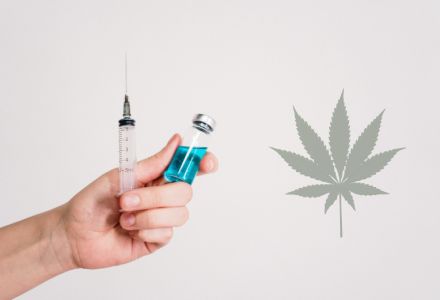What the FCT ( an American consumer protection agency) found out is that not all companies are approaching CBD in the same way. Instead, they found that some companies advertise and claim that their CBD products can treat or even cure medical conditions like multiple sclerosis, epilepsy, Alzheimer's or heart diseases.
- The FTC is cracking down on dishonest CBD sellers
- Fake CBD health claims are flooding the internet
- The science behind CBD is promising, but more human trials are needed
While CBD, a non-intoxicating chemical compound found in the cannabis plant, has been shown to have many potential benefits, claiming that it can cure what modern medicine cannot is going too far.
What does science say about CBD?
Research on the impact CBD can have on human health is ongoing. Plenty of scientists explore the correlation between cannabidiol (CBD) and symptoms of various illnesses, including dementia and multiple sclerosis.
Yet, to be sure about the effects of CBD, we simply need more studies. Many existing studies have not been conducted on humans, or they have been run with subjects using CBD and THC (another cannabinoid with intoxicating effects), making it harder to draw a clear conclusion on the unique effects and benefits of CBD.
Why isn't there more research on CBD?
The lack of research is not because CBD is not promising or exciting. Instead, the scientific community has been hit hard by cannabis prohibition, as it stopped any cannabis research for a good while, significantly slowing down scientific progress on cannabis.
Only recently have scientists been able to look into various cannabinoids properly, including CBD. As a result, most research on cannabis as a medication is very recent.
And while there is a lot of evidence towards the plant's historical use as a medicine, we need modern studies to show that CBD can indeed help with various illnesses.
Is CBD medicine?
There is no scientific evidence to date stating that a CBD supplement you purchase can replace your prescribed medication or put an illness into remission. If you are about to buy products from a brand that claim their 10% CBD oil will cure your autoimmune disease or prevent a heart attack, then keep on searching.
Look for brands that use studies to back up their CBD claims and show CBD for what it is - a supplement that supports your body in various ways, helping it relax and function properly.
CBD as prescribed medication
Even though CBD brands can not make any health claims, it is worth pointing out that cannabis-based prescribed medicine does exist. Sativex or Epidolex are perfect examples.
The fact that cannabinoids are slowly entering the world of modern medicine does show that there is a lot of potential in CBD. Even though cannabis medication often has higher levels of CBD than regular CBD oil and is often accompanied by THC in amounts currently not legal in many countries.
Is Europe doing anything about false CBD claims?
FTS is an American organisation. For that reason, it won't look into claims made by European companies selling CBD in European markets.
The EU considered introducing specific requirements and certifications to ensure no false claims are made and that all products are safe. But unfortunately, the idea of unified standards never came to fruition.
With no organisation having the consumer's back, we need to look for producers who do. Therefore, false medical claims with no scientific backing might, surprisingly, be a blessing in disguise - if you see any, you know right away, that's a red flag. You are better off going for another, more transparent brand.
Our Resources:
10, L., & 6, L. (2019, September 10). Making CBD health claims? careful before disseminating. Retrieved January 18, 2022, from https://www.ftc.gov/news-events/blogs/business-blog/2019/09/making-cbd-health-claims-careful-dissemi...
About cannabis and ms. (n.d.). Retrieved January 18, 2022, from https://www.mssociety.org.uk/about-ms/treatments-and-therapies/cannabis/about-cannabis-and-ms
Cannabis, CBD oil and dementia. (2018, August 31). Retrieved January 18, 2022, from https://www.alzheimers.org.uk/about-dementia/treatments/alternative-therapies/cannabis-cbd-oil-and-d...
History of cannabis. (n.d.). Retrieved January 18, 2022, from https://www.sydney.edu.au/lambert/medicinal-cannabis/history-of-cannabis.html
Peter Grinspoon, M. (2021, September 24). Cannabidiol (CBD)-what we know and what we don't. Retrieved January 18, 2022, from https://www.health.harvard.edu/blog/cannabidiol-cbd-what-we-know-and-what-we-dont-2018082414476




